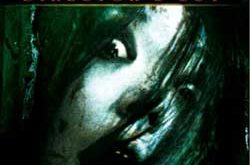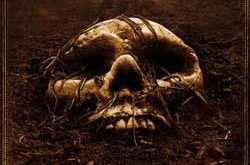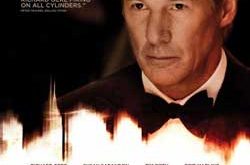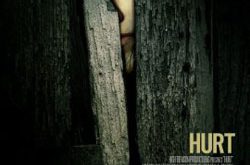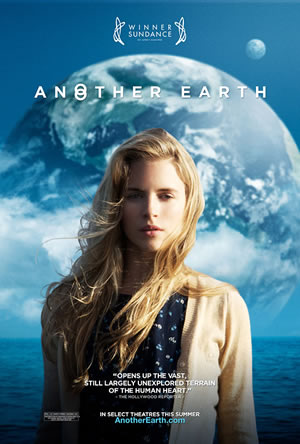
SYNOPSIS:
Rhoda Williams is a bright student preparing to graduate high school and begin classes at MIT. She is surrounded by friends and family, celebrating her acceptance into the prestigious school and drives home intoxicated. Her life is sent spiraling off course when she becomes distracted by the appearance of another Earth in the night sky and collides head on with a passing car, killing its passengers and placing the driver in a coma. After spending four years in prison, she becomes obsessed with the approaching planet, deemed Earth 2, and the man whose life she destroyed in the accident years prior. With her identity safely guarded, she makes it her goal in life to improve the man’s life a little bit more each and every day as the second planet gets closer and closer. Over time, his world becomes more important than even her own.
REVIEW:
Make Cahill’s independent feature, Another Earth, is a small gem. It’s a touching, introspective character study of both Rhoda Williams and John Burroughs, the man whose family Rhoda accidentally killed. The science fiction elements, the idea of an approaching second Earth, are merely backdrop to the main, very personal story between Rhoda and John. It’s all about second chances, decisions and choices. Throughout the film, narration about the planet’s descent perfectly reflect the inner thoughts of the two characters and the world they live in and seek to escape. Both Brit Marling and William Mapother are brilliant in their roles; each is captivating and haunting. Far from perfect and riddled with holes, Another Earth champions over its flaws on the strength of its main characters and its attention to human emotion.
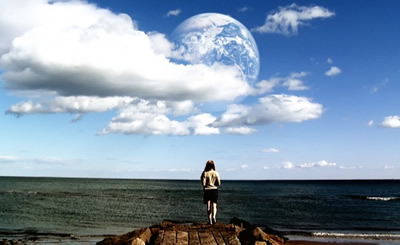 Before the script even allows the audience to understand or embrace its lead, Rhoda Williams, it slams the character into unimaginable tragedy. After just a glimpse of the life she could have led, Brit Marling is asked to portray a character who has lost everything: her hopes, her education, her career, her friends and her future. She brings to the role a sad, remorse young woman in search of meaning and redemption. Even when her obsession with John Burroughs becomes uncomfortable, the character elicits the overwhelming desire for her to be forgiven and rebound from her depression and despair. Marling is afforded multiple scenes to quietly convey her conflicted emotions, torn between revealing her secret to Burroughs and continuing to help him on his road to emotional recovery. She does so wonderfully with deeply sorrowful eyes, woeful expressions and cautious, guarded body language. It’s a strong, compelling performance that literally carries the film.
Before the script even allows the audience to understand or embrace its lead, Rhoda Williams, it slams the character into unimaginable tragedy. After just a glimpse of the life she could have led, Brit Marling is asked to portray a character who has lost everything: her hopes, her education, her career, her friends and her future. She brings to the role a sad, remorse young woman in search of meaning and redemption. Even when her obsession with John Burroughs becomes uncomfortable, the character elicits the overwhelming desire for her to be forgiven and rebound from her depression and despair. Marling is afforded multiple scenes to quietly convey her conflicted emotions, torn between revealing her secret to Burroughs and continuing to help him on his road to emotional recovery. She does so wonderfully with deeply sorrowful eyes, woeful expressions and cautious, guarded body language. It’s a strong, compelling performance that literally carries the film.
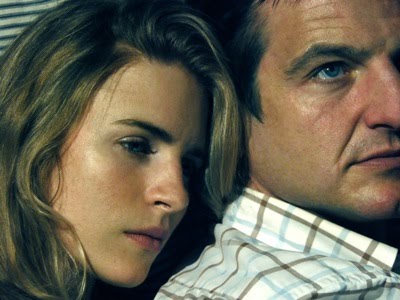 Opposite of Marling is William Mapother as John Burroughs, a character drowning in grief and alcohol. His life is a mess and his home mirrors how distraught and discarded his life and dreams have become. The brooding Mapother begins to shine as a character and an actor as Rhoda slowly chips away at his sorrow, resuscitating and mending the broken man day by day. The more Burroughs comes back to life, the more Mapother takes over the film. The often sudden reminders of the life stolen from him allow the actor to display a perfect balance of rage and anguish. The more his character climbs out of the darkness that has buried him, the more the audience roots for him to prosper and the more they dread his discovering Rhoda’s terrible secret. Mapother is known for playing quiet brooding characters and John Burroughs is a terrific role for him to illustrate why he has gained that acclaim.
Opposite of Marling is William Mapother as John Burroughs, a character drowning in grief and alcohol. His life is a mess and his home mirrors how distraught and discarded his life and dreams have become. The brooding Mapother begins to shine as a character and an actor as Rhoda slowly chips away at his sorrow, resuscitating and mending the broken man day by day. The more Burroughs comes back to life, the more Mapother takes over the film. The often sudden reminders of the life stolen from him allow the actor to display a perfect balance of rage and anguish. The more his character climbs out of the darkness that has buried him, the more the audience roots for him to prosper and the more they dread his discovering Rhoda’s terrible secret. Mapother is known for playing quiet brooding characters and John Burroughs is a terrific role for him to illustrate why he has gained that acclaim.
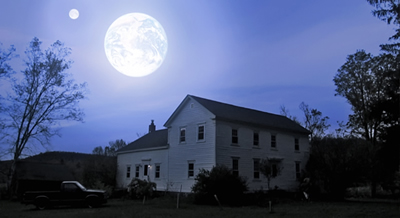 The film is unique in that is mirrors the emotions of the characters with the fantasy that another Earth – a mirror of our own – is slowly approaching continually and increasingly asking a series of “what ifs.” If you were to have a meeting with another you, what would you ask yourself? What would you do? How would you react? The narration accents that with suggesting people do that everyday asking “why did I say that” or “why did I do that.” This is exactly what the two lead characters are doing each frame. It also ponders what if things were different; what if these characters had made other choices, made different decisions or turned left instead of right. Buried quietly in the mix are questions about meaning, purpose and destiny. Rhoda and John are the audience’s guides to those questions and some of the answers. It’s an irresistible concept.
The film is unique in that is mirrors the emotions of the characters with the fantasy that another Earth – a mirror of our own – is slowly approaching continually and increasingly asking a series of “what ifs.” If you were to have a meeting with another you, what would you ask yourself? What would you do? How would you react? The narration accents that with suggesting people do that everyday asking “why did I say that” or “why did I do that.” This is exactly what the two lead characters are doing each frame. It also ponders what if things were different; what if these characters had made other choices, made different decisions or turned left instead of right. Buried quietly in the mix are questions about meaning, purpose and destiny. Rhoda and John are the audience’s guides to those questions and some of the answers. It’s an irresistible concept.
Another Earth is a science fiction films that leaves is fantasy elements behind almost to a fault allowing for far too many plot holes and inconsistencies to flare up. However, the incredibly focused and emotional story between Rhoda and John is so compelling and engrossing it ends up mattering very little. Brit Marling and William Mapother are incredible in their roles, providing thoughtful, rich and complex performances. The idea of another Earth tends to become more of a distraction – even a hindrance – the more involved the story delves into the relationship between Rhoda and John. Thankfully toward the end, the purpose of the titular cosmic anomaly rediscovers its own focus and purpose as well and drives the story home. Strong performances, a well written, meaningful script and a compelling concept combine to create a fascinating tale and a wonderful film. Another Earth is an intriguing and absorbing tale providing a plate full of thoughtful morsels to contemplate long after the film is over.
3.5 out of 5
Another Earth (2011)
 Horror News | HNN Official Site | Horror Movies,Trailers, Reviews
Horror News | HNN Official Site | Horror Movies,Trailers, Reviews
